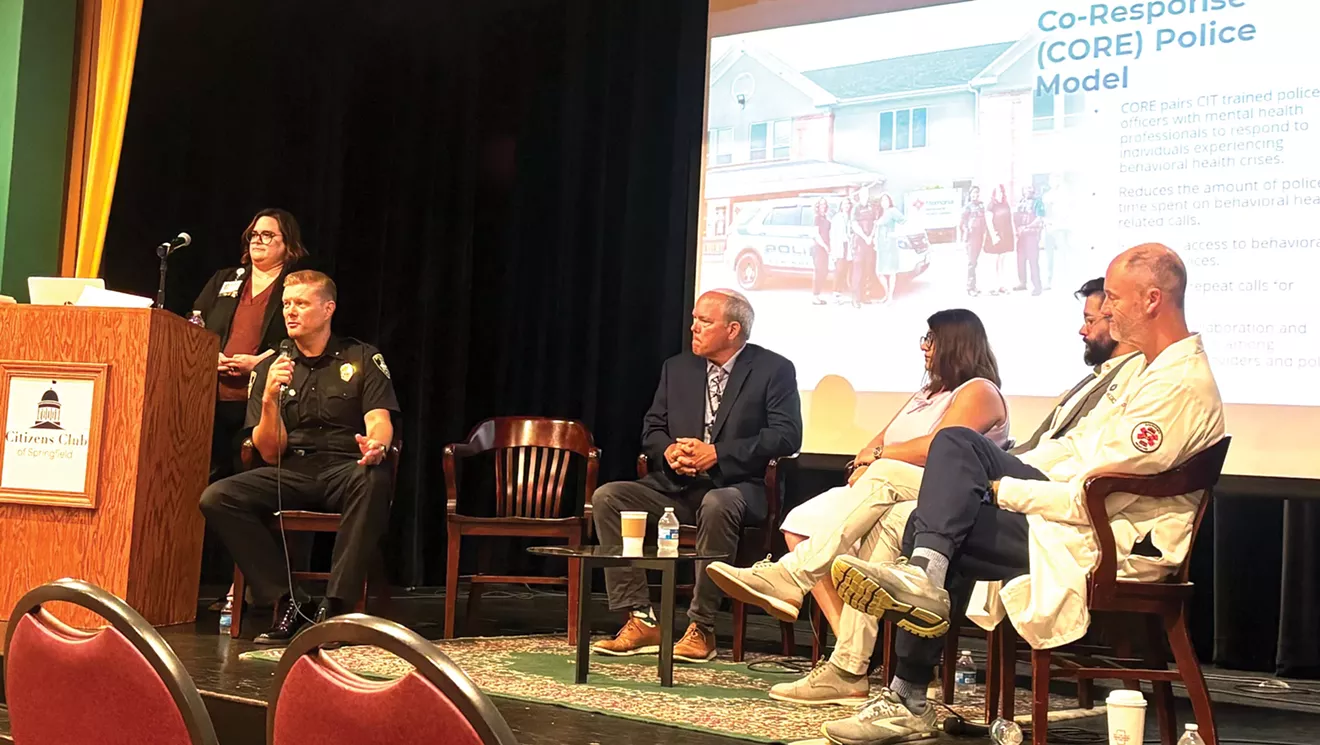
PHOTO BY MAGGIE DOUGHERTY
Deputy Police Chief Joshua Stuenkel, seated at left, discusses Springfield’s co-response model during the Mental Health Matters panel June 27.
“It is not ‘them,’ it is ‘us,'” Jill Steiner said, addressing an audience at Hoogland Center for the Arts last Friday. She asked attendees to approach the morning’s discussion with listening and empathy.
“Put aside the belief that it’s just ‘pull yourself up by the bootstraps,’ ‘get over it,’ ‘move on,’ or ‘it’s just that generation.’ Denial and platitudes cost lives.”
Steiner, Citizens Club board member and human resource and risk management director of the YMCA of Springfield, was moderating a panel hosted by Citizens Club to educate attendees on the available resources and gaps for mental health. The panel featured medical providers and mental health experts, a member of the police and a representative from the Massey Commission.
Mental health is an everyday challenge in Sangamon County, panelists said.
Deputy Police Chief Joshua Stuenkel said the Springfield Police Department engages daily with individuals struggling with mental illness.
“Maybe not for every officer every day, but from our homeless outreach team to our neighborhood police officers and our patrol officers, someone is having this response every day and every shift,” Stuenkel said.
Dr. Christopher McDowell is an emergency physician with Memorial Health and Executive Associate Dean and Professor of Emergency Medicine at SIU School of Medicine. Similarly he said it was “assured” he would see a patient with mental health concerns when he went to work that day.
The panelists shared tips and resources to educate the audience on how best to support neighbors suffering with mental illness, from reducing stigma through sensitive language to recognizing warning signs of suicide.
Lauren Yoggerst, crisis clinician at Memorial Behavioral Health, explained the best hotline numbers to call, including 988 for suicide intervention and substance use crisis support and 211 for referrals to community resources for food, shelter, utility assistance and more. These numbers help de-escalate potential crises before they reach emergency status, at which stage people should call 911, she said. Both hotlines are available 24/7.
Those who contact 988 may remain anonymous, Yoggerst said, but if some risk of immediate harm presents itself, the person on the line may ask questions about where the caller is and whether intervention is needed. Should in-person help be required, the hotline can geolocate from the three major phone companies, T-Mobile, Verizon and AT&T.
When the issue cannot be handled over the phone, a Mobile Crisis Response team of behavioral health clinicians and peers will be deployed. Mobile crisis response is a grant-funded, statewide initiative, but it is run locally through Memorial Behavior Health and available 24/7. Those who need to contact the mobile unit can call directly at 217-788-7070.
In addition to the Mobile Crisis Response team, Springfield has worked to pair police officers with mental health professionals in responding to mental health crises. Officers on these teams receive Critical Intervention Team training, designed to educate officers on recognizing and de-escalating mental health crises.
“As law enforcement, while we are that first call, we recognize that we are not always the right tool,” Stuenkel said. He said the partnership, which was initially met with some hesitancy, is now received well by officers. “They see this as a resource,” he added.
Multiple panelists said Springfield is rich in resources for addressing the mental health needs of the community, but that coordination of service and access to them continues to be a challenge.
John Ridley, director of public health for Sangamon and Menard Counties, introduced Community Mental Health Boards, or 708 Boards, as a missing piece of the puzzle. Establishing a 708 Board was the first recommendation passed by the Massey Commission.
Precedent for the boards was created in 1976 in Illinois by the Community Mental Health Act, introduced by Illinois House Bill 708. Such boards exist in over 90 counties, municipalities and townships across Illinois, according to the League of Women Voters.
“If you look at what counties have community mental health boards, Sangamon County is kind of the hole of the donut,” Ridley said. He urged attendees to support a tax referendum, scheduled for spring 2026, to fund the board.


